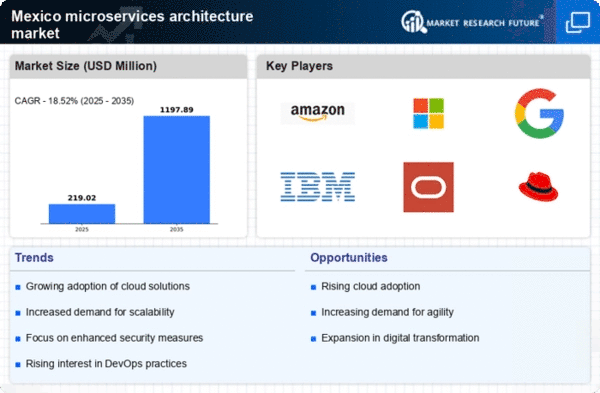Growing Demand for Scalability
The microservices architecture market in Mexico is experiencing a notable surge in demand for scalable solutions. As businesses expand, they require systems that can efficiently handle increased workloads without compromising performance. This architecture allows organizations to develop and deploy applications in a modular fashion, enabling them to scale individual components as needed. According to recent data, the scalability offered by microservices can lead to a reduction in operational costs by up to 30%. This flexibility is particularly appealing to Mexican enterprises looking to enhance their digital capabilities while maintaining cost-effectiveness. The growing emphasis on scalability is likely to drive further investments in microservices architecture, as companies seek to remain competitive in an evolving market landscape.
Rising Importance of DevOps Practices
The adoption of DevOps practices is gaining traction in Mexico, significantly impacting the microservices architecture market. DevOps emphasizes collaboration between development and operations teams, fostering a culture of continuous integration and delivery. Microservices architecture complements this approach by enabling teams to work on different services simultaneously without dependencies. This synergy is leading to improved deployment frequencies and reduced lead times for changes. Data suggests that organizations implementing DevOps alongside microservices can achieve deployment speeds that are 50% faster than traditional methods. As more Mexican companies embrace DevOps, the demand for microservices architecture is expected to rise correspondingly.
Emergence of Industry-Specific Solutions
The microservices architecture market in Mexico is witnessing the emergence of industry-specific solutions tailored to meet the unique needs of various sectors. As businesses seek to differentiate themselves, there is a growing trend towards developing microservices that cater to specific industry requirements, such as finance, healthcare, and retail. This specialization allows organizations to leverage the benefits of microservices while addressing the distinct challenges of their respective industries. Recent analyses indicate that industry-specific microservices can enhance operational efficiency by up to 35%. This trend is likely to drive further innovation within the microservices architecture market, as companies strive to create customized solutions that enhance their competitive edge.
Increased Focus on Digital Transformation
The microservices architecture market in Mexico is being propelled by an increased focus on digital transformation across various sectors. Organizations are recognizing the need to modernize their IT infrastructure to remain competitive. Microservices facilitate this transformation by allowing for the gradual migration of legacy systems to more flexible architectures. Recent statistics indicate that companies investing in digital transformation initiatives are likely to see a return on investment of approximately 25% within the first year. This trend is encouraging Mexican businesses to adopt microservices architecture as a means to streamline operations and improve customer experiences, thereby driving market growth.
Shift Towards Agile Development Practices
In Mexico, there is a marked shift towards agile development practices, which is significantly influencing the microservices architecture market. Agile methodologies promote iterative development, allowing teams to respond quickly to changes and deliver features more rapidly. Microservices align well with these practices, as they enable independent deployment and testing of services. This alignment is fostering a culture of innovation among Mexican companies, with many reporting a 40% increase in development speed after adopting microservices. The integration of agile practices is likely to continue driving the adoption of microservices architecture, as organizations strive to enhance their responsiveness to market demands.
















